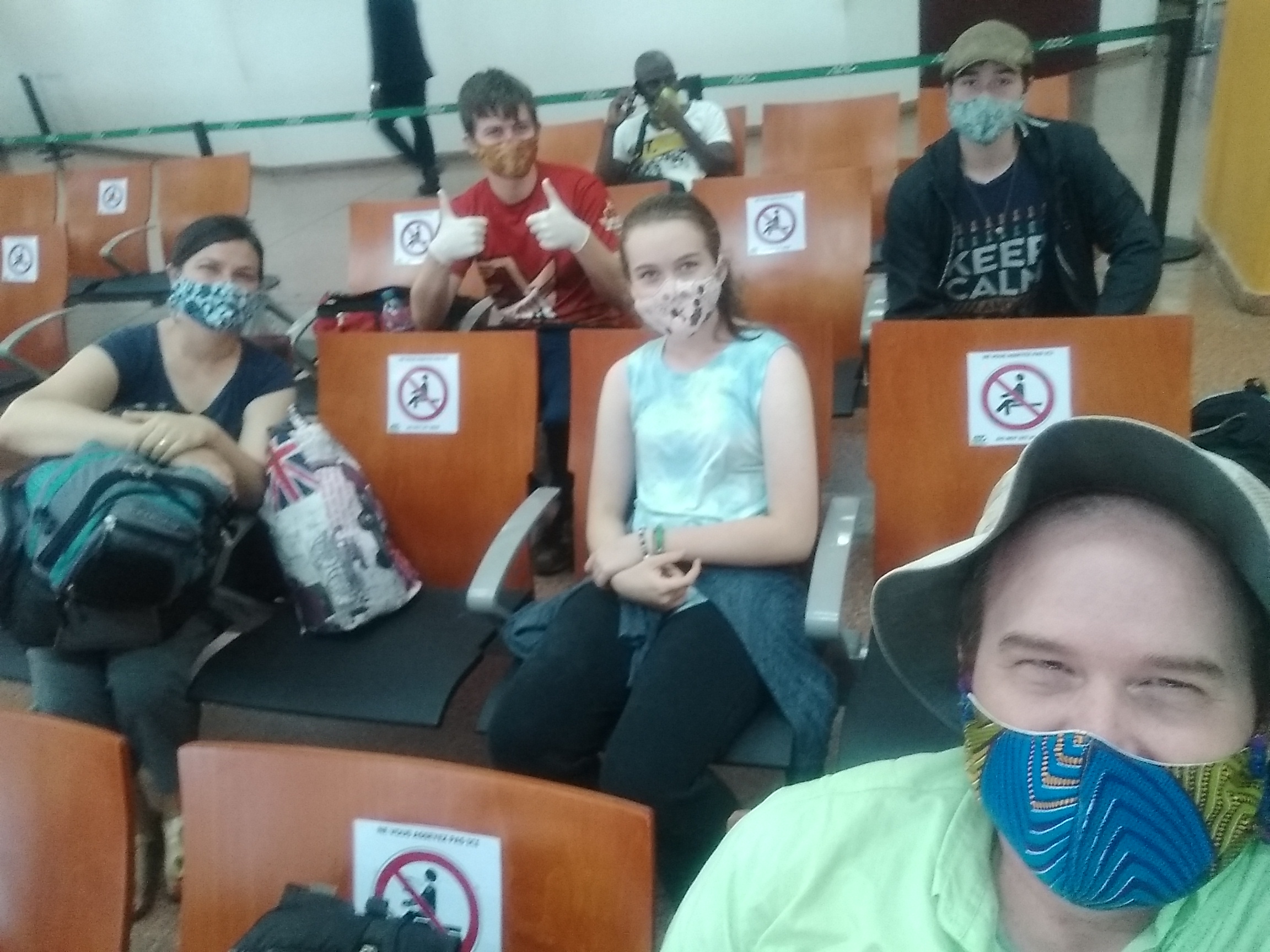
The Yaounde airport had these great stickers that tell you not to sit in every other seat. Somehow I doubt the airplane will be like this…

The Yaounde airport had these great stickers that tell you not to sit in every other seat. Somehow I doubt the airplane will be like this…
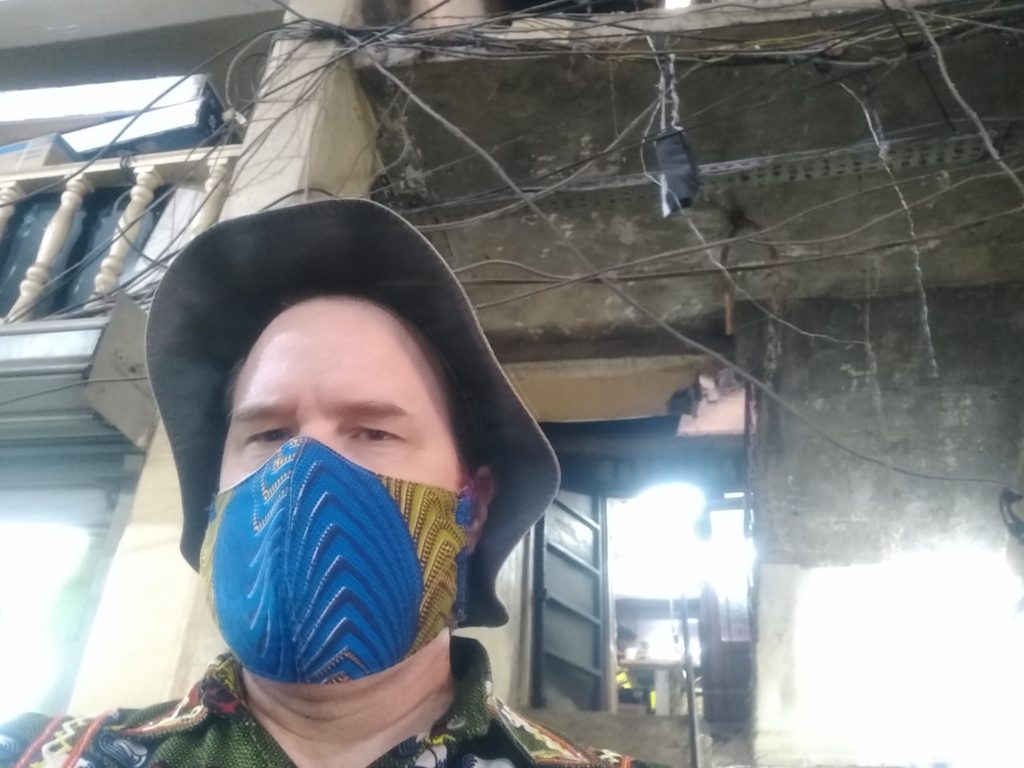
For I want you to know how great a struggle I have for you and for those at Laodicea and for all who have not seen me face to face, that their hearts may be encouraged, being knit together in love, to reach all the riches of full assurance of understanding and the knowledge of God’s mystery, which is Christ, in whom are hidden all the treasures of wisdom and knowledge. I say this in order that no one may delude you with plausible arguments. For though I am absent in body, yet I am with you in spirit, rejoicing to see your good order and the firmness of your faith in Christ. (Col 2:1-5 ESV)
I heard a meditation this morning that included this passage, and it seemed to me very apropos for this time.
The point that shocked me the most (which really shouldn’t have but did) is that isolation ministry is by no means a new thing. Yes, we know that Paul spent a lot of time in prison, and that much of what we have in written from him in the New Testament is a consequence of that fact. Certainly Paul spent time with many people in face to face ministry, but for large chunks of his ministry, he simply couldn’t. Hence we have
how great a struggle I have for you and for those at Laodicea and for all who have not seen me face to face
He has extreme concern for these people and for the fruit of the gospel in their lives, and he expresses it in useful and powerful ways in his writing, though they have not yet seen each other face to face.…
So I think the point here is to take this time of isolation as a time of enforced creativity. What can we do now, because we must? One scholar in my field wrote a book while laid up with a broken leg. Bad for him in isolation, but it brought great results for our field. I’ve gotten to know WhatsApp a lot better, as that is my only contact with our local church here. One of my colleagues is even getting new language data through WhatsApp. Not something to do if you have alternatives, but I was encouraged to see him forging a way forward given that he didn’t.
The systems I would normally use for online collaboration didn’t get set up (between me and any Cameroonian language groups) before isolation orders came down, so one strategic change this will make in my work is that collaboration (including online data backups) will be the first agenda item in any work that I do. And it really should have been all along, but it just seems like one of those things you can let slide (until you can’t, much like backups.…)
The other point in this passage relevant to our time is one of the why’s Paul states:
I say this in order that no one may delude you with plausible arguments.
I talk with my children about plausibility a lot, since it seems like an important concept in this phase of the information age. That is, in the time where what is actually true is less important than what sounds plausible. That is, if we hear something from a news source we trust (when did that become a thing?!?), if we can say “that sounds right”, then we believe it (or at least we’re more inclined to).
The result of this appears to be that the internet seems full of people saying all kinds of unproven (and at times unprovable) things, which align with one worldview/narrative enough that it can be accepted, because it “sounds right” from within that worldview. But is it actually true? We seem to have stopped even asking that question. So each one accepts only what sounded right based on assumptions and beliefs held before the information was ever heard. The consequence of this is the phenomena of echo chambers all around, with no one actually listening to opposing views, and no one (apparently) open to seeking or hearing the truth.
This is problematic for me, because I worship the Truth. He also called himself the Way, and the Life (John 14:6). What this means to me is that when I seek truth, it is part of my worship of Jesus. And when I ignore (or don’t care about) the truth, I ignore (or don’t care about) Jesus. So it is important to me to help push people into caring about the actual facts of a matter, before casting judgement on the basis of what is plausible alone.
But the phrase translated “plausible arguments” in the ESV actually has a number of different renderings in different translations: “well-crafted arguments” (NLT), “fine-sounding arguments” (NIV), “smooth rhetoric” (BSB), “persuasive argument(s)” (NASB/HCSB), “persuasive words” (NKJV), “arguments that sound reasonable” (CSB/NET), “false arguments, no matter how good they seem to be” (GNT). So whether the idea of plausibility means much to you or not, I hope it is clear that arguements that sound right but are not (by whatever means) are not good. And Paul is explicitly fighting against these arguments, as part of his Gospel ministry. And he brings this back to the fact that he is not physically present with them:
For though I am absent in body, yet I am with you in spirit, rejoicing to see your good order and the firmness of your faith in Christ.
So perhaps what I’m saying is that I’d love the Christian church to be known, especially in this time, as people who take twitter and facebook (or whatever way we communicate other than face to face) as opportunities for ministry. That we would seek to make our communication based on reconciliation (between each other, and with God; 2Cor 5:20, Eph 2:14), and on truth –valuing it both in our own truthfulness, and in the reverence for the truth that we encourage in others. Because after all the online debates are done, after each viral video passes, the fundamental truth of our universe is that we should worship
Christ, in whom are hidden all the treasures of wisdom and knowledge. (Col 2:2b-3 ESV)
I never met a woman named Peninnah until I lived in Africa. I recall first hearing this name, mostly because it was so strikingly novel that I assumed it was a mistake, and had to ask her name again. Even my spellchecker doesn’t recognize this name. But since that first one I met in the year 2000, I’ve known several —but all in Africa.
I found the above particularly interesting, given that it is a Biblical name. People like naming their kids after heroes of the Bible. So why are all the Peninnahs (that I’ve known) in Africa? Why don’t we name our daughters Peninnah in the US? A look at Peninnah’s story sheds light on this, and helps us know a bit more about Africa, and about the promises of God.
She is introduced at the beginning of 1 Samuel 1 (all ESV) :
[Elkanah] had two wives, one named Hannah and the other Peninnah. And Peninnah had children, but Hannah had none. (v1)
An exhaustive search of the Bible yields only four references to “Peninnah”, all in 1 Samuel 1:2-6. We know that she was loved and cared for by her husband:
And whenever the day came for Elkanah to present his sacrifice, he would give portions to his wife Peninnah and to all her sons and daughters. (v4)
But as might be expected in a polygamous household, there was not equal love and care for the two wives:
But to Hannah he would give a double portion, for he loved her even though the LORD had closed her womb. (v5)
So we see that Hannah has more love and care from her husband, but Peninnah has children. Naturally, these two wives of Elkana did not get along:
Because the LORD had closed Hannah’s womb, her rival [Peninnah] would provoke her and taunt her viciously. And this went on year after year. Whenever Hannah went up to the house of the LORD, her rival taunted her until she wept and would not eat. (vv6-7)
So one might say that Peninnah was not a particularly nice woman. This may have come in part from her husband loving his other wife more, but in any case, she made Hannah’s life miserable.
In terms of understanding the scriptures, Peninnah is perhaps most helpful to us as a contrast with Hannah, who later gives birth to Samuel. Interestingly enough, I can’t recall ever meeting an African Hannah. But 1 Samuel gives us a lot more information on Hannah. Her character is revealing in response to her co-wife’s taunting:
In her bitter distress, Hannah prayed to the LORD and wept with many tears. (v10)
Her prayers are so moving they are taken for drunkenness. But in the end, the priest of Shiloh looks favorably on her:
“Go in peace,” Eli replied, “and may the God of Israel grant the petition you have asked of Him.” (17)
Whatever might be said of the value of the priesthood of Eli and his sons (e.g., 1 Sam 2:12), Hannah’s worship seems sincere:
The next morning Elkanah and Hannah got up early to bow in worship before the LORD, and then returned home to Ramah. (v19a)
Curiously, Peninnah doesn’t seem to be there at this time. Did she no longer go to Shiloh to worship with her Husband each year? Or was she just written out of the story at this point, as unimportant? Either way, her importance to the story is at least minimized, and there is no Biblical evidence of faithful worship from her at this point (since v4), whereas the importance of Hannah’s faith is paramount:
And Elkanah had relations with his wife Hannah, and the LORD remembered her. So in the course of time, Hannah conceived and gave birth to a son. She named him Samuel, saying, “Because I have asked for him from the LORD.” (vv19b-20)
Hannah prayed for a son, and attributed giving birth to him to God. And in time, she fulfilled the vow she made in v11:
Once she had weaned him, Hannah took the boy with her, along with a three-year-old bull, an ephah of flour, and a skin of wine. Though the boy was still young, she brought him to the house of the LORD at Shiloh. And when they had slaughtered the bull, they brought the boy to Eli.
“Please, my lord,” said Hannah, “as surely as you live, my lord, I am the woman who stood here beside you praying to the LORD. I prayed for this boy, and since the LORD has granted me what I asked of Him, I now dedicate the boy to the LORD. For as long as he lives, he is dedicated to the LORD.”
So they worshiped the LORD there. (vv24-28)
And as if that were not enough, Hannah gives a magnificat-esque song of thanksgiving (in 1 Sam 2:1-10), prefiguring Mary’s song of praise after Jesus met John the Baptist, while each was still in the womb (in Luke 1:46-55).
So we see that Peninnah and Hannah provide an interstesting clash between what the scriptures elsewhere call children of the flesh and children of the promise.
In Galatians, this contrast is described in terms of law v promise:
For if the inheritance comes by the law, it no longer comes by promise; but God gave it to Abraham by a promise. (Gal 3:18)
This is an argument against trusting in the Law, but Paul continues to make explicit reference to children born, either as a result of the power of the flesh (the way children are normally born), or as a result of the promise of God.
For it is written that Abraham had two sons, one by a slave woman and one by a free woman. But the son of the slave was born according to the flesh, while the son of the free woman was born through promise. Now this may be interpreted allegorically: these women are two covenants. One is from Mount Sinai, bearing children for slavery; she is Hagar. Now Hagar is Mount Sinai in Arabia; she corresponds to the present Jerusalem, for she is in slavery with her children. But the Jerusalem above is free, and she is our mother. (Gal 4:22-26)
So Paul says that the children born by the natural power of the flesh are born into slavery, whereas the children born by the supernatural power of the promise of God are born for freedom, for heaven. And just like with Peninnah and Hannah, the two kinds don’t get along:
Now you, brothers, like Isaac, are children of promise. But just as at that time he who was born according to the flesh persecuted him who was born according to the Spirit, so also it is now. But what does the Scripture say? “Cast out the slave woman and her son, for the son of the slave woman shall not inherit with the son of the free woman.” So, brothers, we are not children of the slave but of the free woman. (Gal 4:28-31)
Note that these references are made to the children of the two wives of Abraham (Sarah and Hagar), but the same applies to Peninnah and Hannah. The one bears children by her own strength, and the other, devoid of any such power of her own, bears children by the promise of God.
This principle is found throughout the new testament. The writer of Hebrews talks about the faith of Abraham as a confidence and trust in a specific promise of God:
For when God made a promise to Abraham, since he had no one greater by whom to swear, he swore by himself, saying, “Surely I will bless you and multiply you.” And thus Abraham, having patiently waited, obtained the promise. (Heb 6:13-15)
And Paul in Romans contrasts again the inheritance according to the law, and the inheritance according to the promise.
For the promise to Abraham and his offspring that he would be heir of the world did not come through the law but through the righteousness of faith. For if it is the adherents of the law who are to be the heirs, faith is null and the promise is void. (Rom 4:13-14)
I think of it this way. If your father (or someone else you trusted) promised to give you something of great value (house, boat, boathouse, etc), but it you were concerned that he might not follow through, would it make sense to take him to court over it? To go before a judge and insist that you have a legal right to have a personal promise fulfilled just doesn’t make sense. Rather, if a person has promised something, you can address the fulfillment of that promise on the basis of that personal relationship. Unless, of course, your objective is to ditch the relationship and wrangle what you can from the person by force. Good luck trying that with God….
As I think about the promise(s) of God, it helps me to ask what specific promise(s) we’re talking about. This is because I think people can get fuzzy in their thinking, and think of general “promises” without really having something in mind. Whereas I think God has made specific promises which I think are good for us to trust in, just as we commit specific sins of which it is good for us to repent. Romans 9 gives us a very important clarification of (at least one) promise to Abraham, with its relation to election and the salvation of a remnant, as opposed to the whole:
But it is not as though the word of God has failed. For not all who are descended from Israel belong to Israel, and not all are children of Abraham because they are his offspring, but “Through Isaac shall your offspring be named.” This means that it is not the children of the flesh who are the children of God, but the children of the promise are counted as offspring. For this is what the promise said: “About this time next year I will return, and Sarah shall have a son.” (Rom 9:6-9)
So the promise was the supernatural birth to Sarah, a 90+ year old woman. For this passage, it is importantly not the natural birth to Hagar, a much younger and more fertile woman. And these two births distinguish between two lines of descendants of Abraham. And So Romans 9 shows “the word of God has [NOT] failed”, because the promise of salvation never was to all Abraham’s descendants, but rather to his descendants by the promise to Sarah.
In the same way, as we look at “all Israel” later in history, we see that not all are saved. But the promise of God never was that each individual would be saved. Rather, those who are born of the promise will be saved, and those who are born of the flesh will not. Jesus says it this way:
Jesus answered him, “Truly, truly, I say to you, unless one is born again he cannot see the kingdom of God.… That which is born of the flesh is flesh, and that which is born of the Spirit is spirit.…” (John 3:3,6)
So those of us who are born again, who are born of the Spirit, according to the promise of God, will see the kingdom of God. Notably, those whose inheritance derives only from the law, or from their own strength, will not.
To me, this is a very sharp criticism of the “self made man.” American culture is full of the ideal of managing everything by our own strength, of never depending on anyone else. I think it is good to be responsible, and to attend to our daily needs without excessively burdening others. But the clear teaching of scripture is that it is the one who depends on the promise of God, not his own strength, who is approved by God.
21After saying these things, Jesus was troubled in his spirit, and testified, “Truly, truly, I say to you, one of you will betray me.” 22The disciples looked at one another, uncertain of whom he spoke. 23One of his disciples, whom Jesus loved, was reclining at table at Jesus’ side, 24so Simon Peter motioned to him to ask Jesus of whom he was speaking. 25So that disciple, leaning back against Jesus, said to him, “Lord, who is it?” 26Jesus answered, “It is he to whom I will give this morsel of bread when I have dipped it.” So when he had dipped the morsel, he gave it to Judas, the son of Simon Iscariot. 27Then after he had taken the morsel, Satan entered into him. Jesus said to him, “What you are going to do, do quickly.” 28Now no one at the table knew why he said this to him. 29Some thought that, because Judas had the moneybag, Jesus was telling him, “Buy what we need for the feast,” or that he should give something to the poor. 30So, after receiving the morsel of bread, he immediately went out.
—John 13:21-30 ESV
And it was night.
A few years ago, our pastor in Texas preached a whole sermon around this last sentence, “And it was night.” I was amazed how much he pulled out of that, which I don’t recall exactly now, but was along the lines of these:
Anyway, Tim Keller recently (on Psalm 11, with many of the same ideas here) reminded me of the time of waiting between Jesus’ betrayal and resurrection, and I connected the two in a new way, and considered an application to our times.
The night surrounding the betrayal of Jesus was dark —physically, morally, and spiritually. And now, as we await the celebration of the His resurrection on Sunday, we have an opportunity to consider what that must have been like for the disciples to endure. They believed in Jesus, but didn’t know at the time how it would turn out.
Just as we sit here, in the middle of this pandemic, with little idea how things will turn out. We try to do the right thing, but that isn’t always rewarded. We miss things we depend upon in our daily lives, and regulations seem to just keep changing, as different authorities try to figure out the best course through this time.
But despite the fact that the disciples didn’t know that Sunday was coming (though they were told), it was coming, and it came. God did not abandon them, and He won’t abandon us now. The end of this pandemic will come, though we don’t know how, or when, or at what cost. And we know that on the other side of it, God will still be good.
I find it amazing that the Spanish/Swine flu of 1918-1920 (described in great detail here) hasn’t been talked about much, for two reasons. First, I think it amazing that we have lost this very relevant history. There were some 500 million cases, and some 50 million deaths. COVID-19, as of today, seems to have about 1.6 million cases, and less than 100 thousand (0.1 million) deaths. I don’t mean at all to belittle the suffering many people are going through; I know this is very hard on many people —we are not yet sick, but under isolation orders, and we know many are worse off. But I wonder if we would panic as much, if we thought through the fact that only 100 years ago, there was a much more deadly influenza, and we got through that one.
The second reason I find current ignorance of the Spanish/Swine flu of 1918-1920 interesting is because of what that ignorance says about it. Yes, people died. And yes, it was horrible. And yes, today people are dying, and it is horrible. But one century later, no one remembers that horror. Will our current horror, as much as we feel it today, be remembered in 2120? Again, I don’t mean to belittle the pain and grief that any of us are going through, but I find these things give me perspective.
Anyway as we move from Good Friday to Easter together, let’s take some time to grieve our losses (for they are many), feel the pain, and process it in perspective. We can’t see the other side of this thing yet, but we know it is there. And we may not feel God’s goodness now, but we know that He is good, and that we will feel that goodness again, some day. Let us pray to trust Him in the mean time, with full assurance that Sunday is on it’s way.
We have now been back in Africa almost eight months, and in addition to organizing the physical necessities of our house (including receiving our sea freight shipment!), we have had a lot of personal adjustment to do.
Those who have lived cross-culturally are often surprised by what can be called reverse culture shock; it has been described relevant to a number of different domains:
The gist is that you expect culture shock when you go somewhere with a different culture, but you don’t expect culture shock when you come back. The fact that you have been living in another culture changes you, so you experience culture shock coming back to your passport country, but because you don’t expect it, it can be hard to deal with —you can have a hard time figuring out why it doesn’t feel like “home.”
Anyway, that all is stuff we’ve dealt with a number of times (like trying to buy peanut butter and jelly in Fred Meyer in 2000), and we’ve worked through it and come to expect it. But I think the best way to describe our current situation is that we’ve found another layer, which I’m calling “reverse reverse culture shock”. That is, when we returned from DR Congo in 2013, and blitzed through Oregon and California to move to Texas for my doctoral program, we knew we wouldn’t feel at home. As we got to know Texas, we got to know a lot of things, liking some more than others. :-) But however we felt, we had constant reminders that we weren’t from there, so we always had a framework to understand that nagging feeling of not belonging. Then last year, we were finally going back to Africa!

Granted, we are not so naive as to think that all of Africa is the same. There is some 2,140 languages in Africa; this is a main reason we are here, after all! Each one of those languages holds at least some cultural distinctives, however much similarity there might be between any two languages or cultures. Our first experience on African soil as Wycliffe missionaries was in Cameroon, where we currently live. But since then, our experience has been on the other side of the continent, in East Africa (Kenya, Tanzania, and Uganda) and DR Congo. DR Congo was an interesting counterpoint to the other countries we worked in because it has French as a national language. It also has laws and customs more common in ex-French colonies (as opposed to laws and customs in ex-British colonies, such as Kenya).
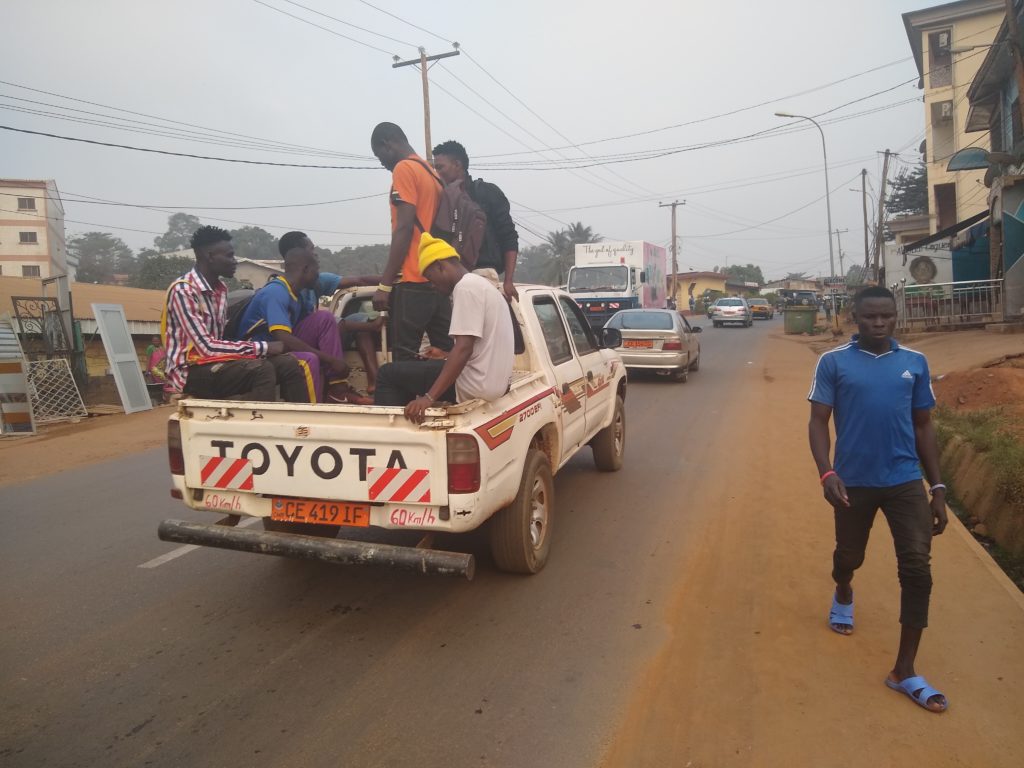
But whether the DR Congo distinguishes itself as an ex-Belgian colony, or for whatever other reason, it stands to reason that DR Congo and Cameroon are simply not the same country, so we shouldn’t expect them to be.

But there are so many things that you can generalize between them, like the love of soccer (OK, maybe that’s everyone but the USA :-)), beignets, and acronyms.
I’ve been thinking about this last one quite a bit in the last couple weeks, because of how differently Congolese and Cameroonians make acronyms. For instance, in DR Congo, each protestant church denomination is known by an acronym and a number. One group we worked with was called CECCA/16 (planted by WEC). The full name of the church is Communauté Evangélique du Christ au Cœur de l’Afrique (“evangelical community/church of Christ in the heart of Africa”), and it’s registration number with the DRC government is 16, hence the full common name with acronym/number. This is notably not the same group as CECA/20 (was planted by AIM), with full name Communauté Evangélique au Centre de l’Afrique (“evangelical community/church in the heart of Africa”). In each case, the longer/lexical words get one letter each in the acronym, and the smaller/grammatical words do not. The fact that CECA and CECCA are pronounced the same is ameliorated by the use of the government registration numbers, to keep their common names distinct.
But in Cameroon, there is often a different system in place. I don’t know that I’ve fully understood it, so I’ll just present some data. :-) The government ministry I visited last week is MINEDUB, MINistère de l’EDUcation du Base (“Ministry/department of Basic/primary Education”). Here we have three letters from the first lexical word, three from the second, and one from the third (apparently avoiding MEB, MINEDUBAS, and MINEBAS). On the other hand, the Department of Secondary Education is MINESEC, MINistère des Enseignements SECondaires (“ministry/department of secondary teaching/education”), and the Department of Higher Education is MINESUP, MINistère de l’Enseignement SUPerieur (“ministry/department of higher education/teaching”). In these last two cases, we get three letters from the first and last lexical words, and one letter from the second word.
Lest anyone think I’m picking on government bodies (which I’m not, it was just three related bodies whose acronyms presented themselves), the linguistic conference that I attended last March is NASCAL, the NAtional Symposium on CAmeroonian Languages, with two letters from the first and third lexical word, and one from each of the other two.
And the denomination of our local church here is MEEC, Mission de l’Eglise Évangélique du Cameroun (“mission of the evangelical church of Cameroon”), which, while having an acronym I might expect, appears to be unrelated to the EEC, l’Eglise Évangélique du Cameroun (“the evangelical church of Cameroon”). I never thought I would miss those helpful numbers to disambiguate otherwise similar sounding names.
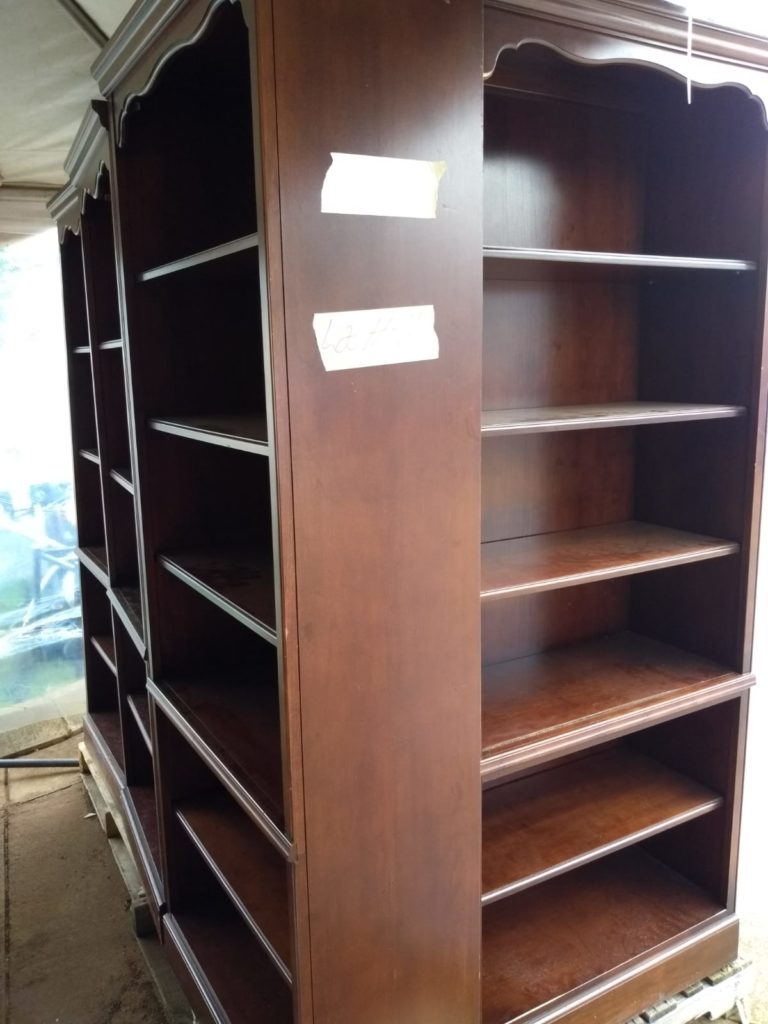
Anyway, one of the major elements of cultural adjustment, we have found, is building triviality. There are lots of things we just don’t think about in our daily life, and that goes away when you’re having to think through every little thing as you interact with people who think differently in another culture. Funny how the way people build acronyms can differ, and cause you to have to think through something you never had to spend energy on before. I’ll try to do a few more posts on other ways I’ve found reverse reverse culture shock, readjusting to our life and work in Africa.
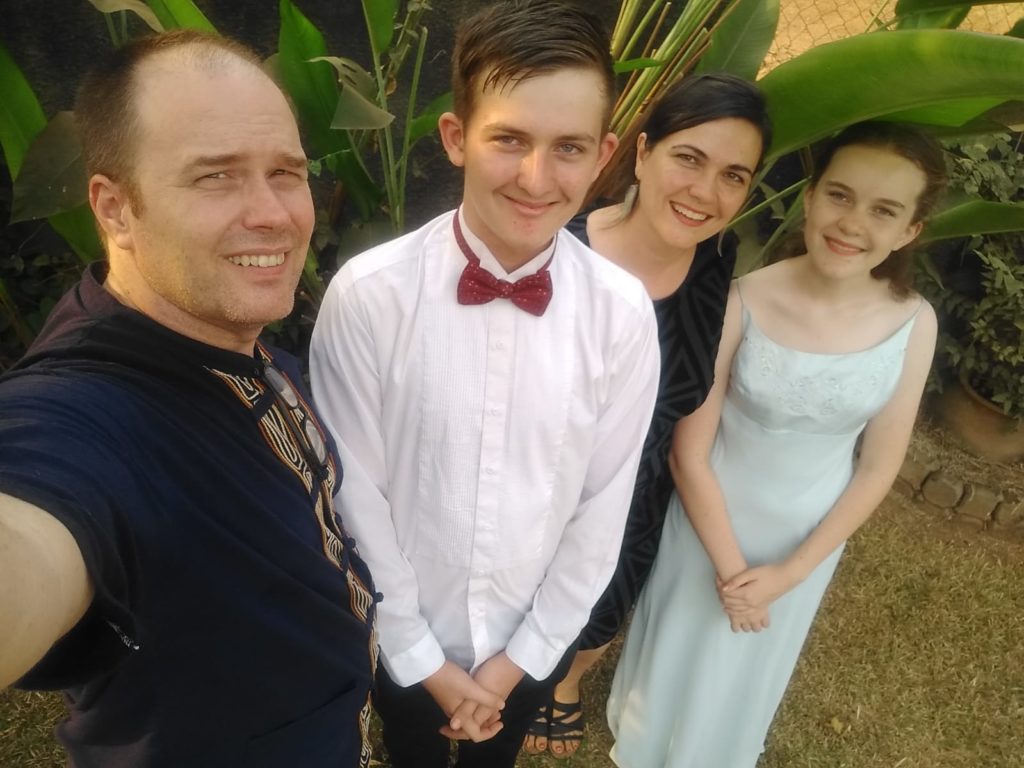
Here are a few other fun acronyms we’ve found around here:
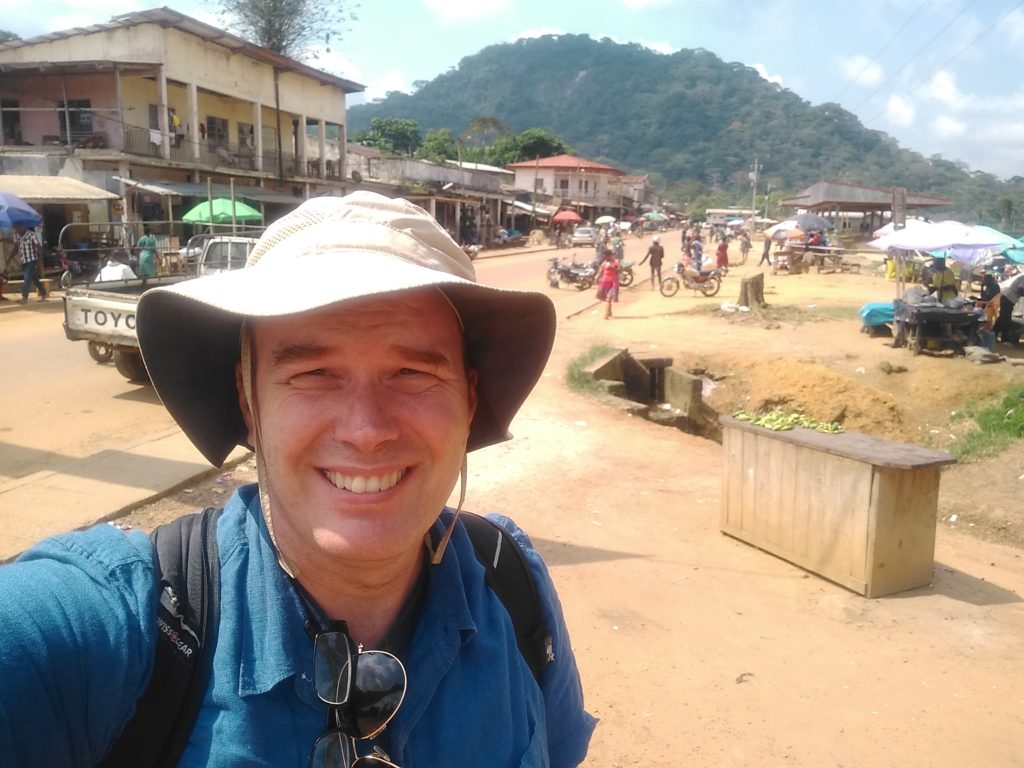
Friday I had officially given up on the idea that I would run a workshop in February. I wrote the committee involved the Friday before, a week after they said they would get back to me with dates. I’m not ruling out working with them in the future (in fact I hope I do!), but it won’t be this month. Because this was the time I had set aside for them, it probably won’t be this fiscal year.
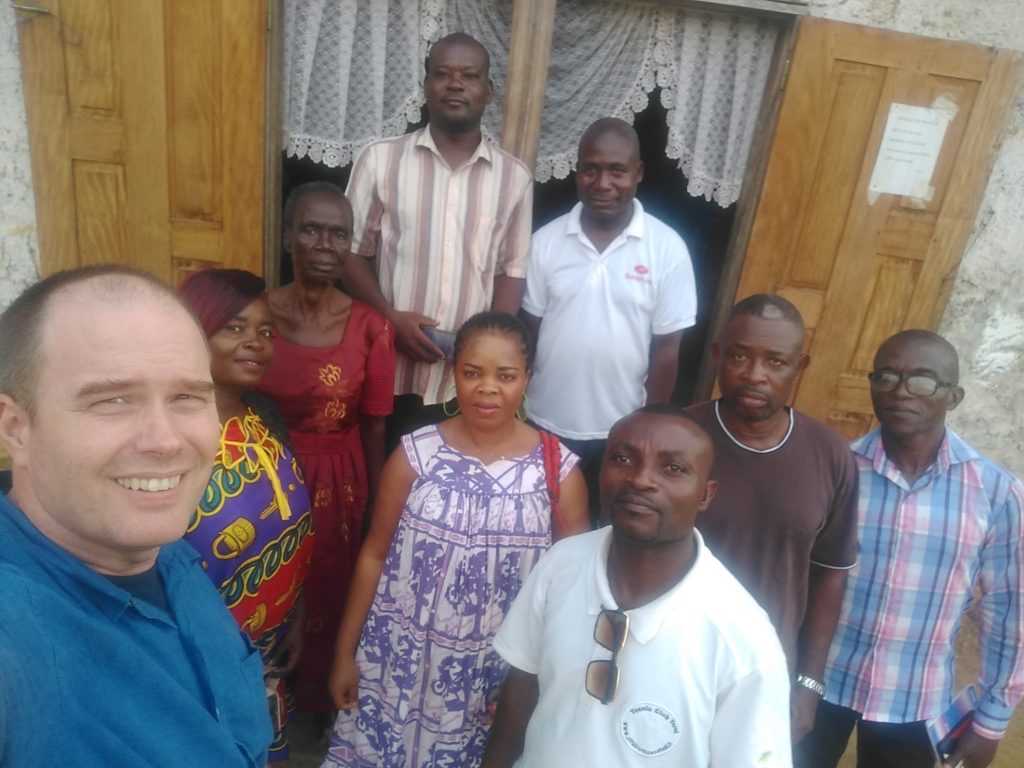
Which is sad given the time and energy I put into visiting local churches, and preparing for this work. But I think it is best to move forward on the right footing, so we will wait for now, and trust that God will provide for this work at the right time.
Perhaps ironically, The same day I also had another opportunity fall into my lap. I have been having pain in my lower back, so I’ve been icing it a lot, and wearing a brace if I’m going to do a lot of sitting (as often happens in an office :-)). Often, that means I wear one of my newer shirts that we made since we got here. It is large and long enough to cover the brace comfortably, so it is a good choice, even if a bit more dressy than I would normally go to work. Anyway, today at a group meeting our director scanned the crowd for someone more dressed up to go on a visit to the ministry of primary education, and she asked me.… Definitely the first time in my life I could be said to have won anything like a “best dressed” award.…

This isn’t my first time on an official visit like this; a few months ago I joined her on a visit to an Indigenous Peoples Day event, and I actually enjoyed several interactions that would not have been possible had I not been there, as a linguist. These events may be more about politics and public relations, but given the amount of linguistics we do, I think it is good to have a linguist around as well, which is why my being there made sense.
This time there was a lot less interaction between myself and the other people at the conference, though I did get to hang out with Cameroonians who work with us.
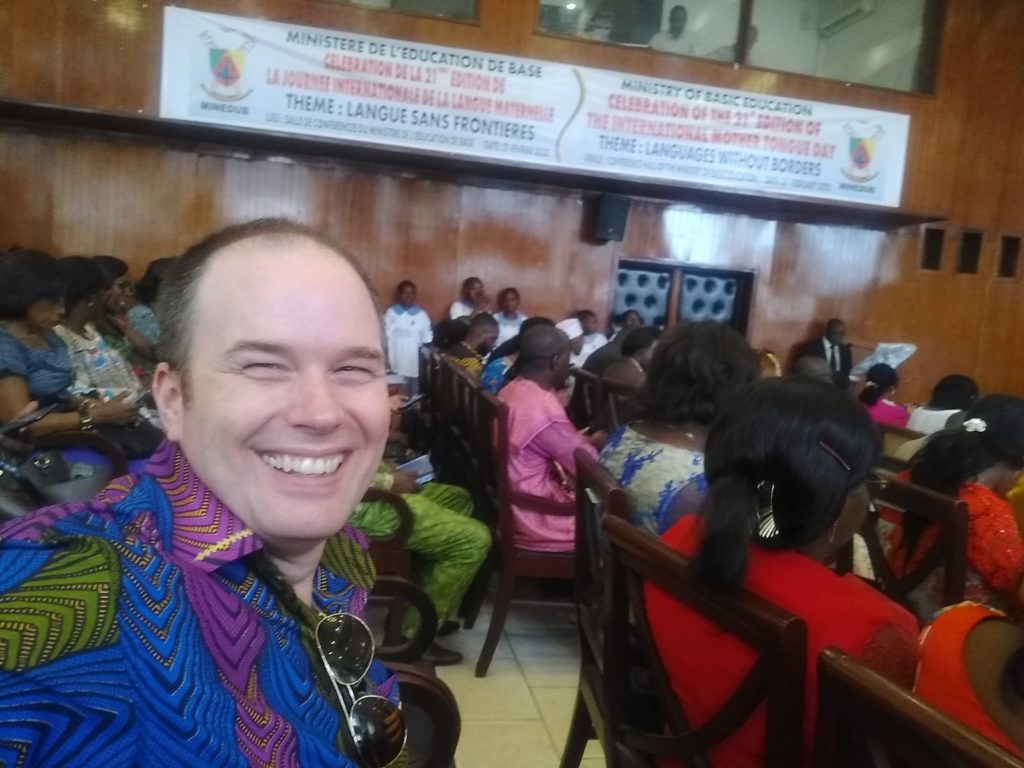
One reason for this is that this event was put on by a government ministry, so the power distance between me and the guy at the center of the front table (the minister of primary education, a cabinet level position in Cameroon) was much greater. And there were other Cameroon government officials, e.g., SG MINEDUB on the right here:
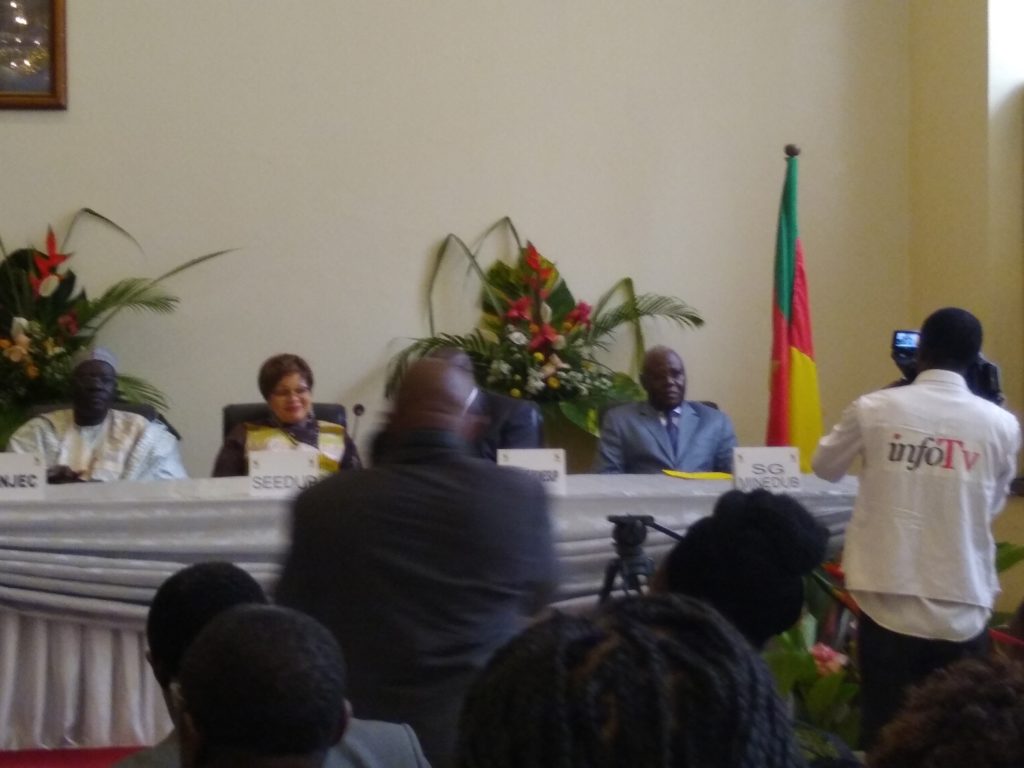
Which didn’t mean there was no interaction; I got to take pictures like everyone else, and got a selfie with the minister (blue suit):
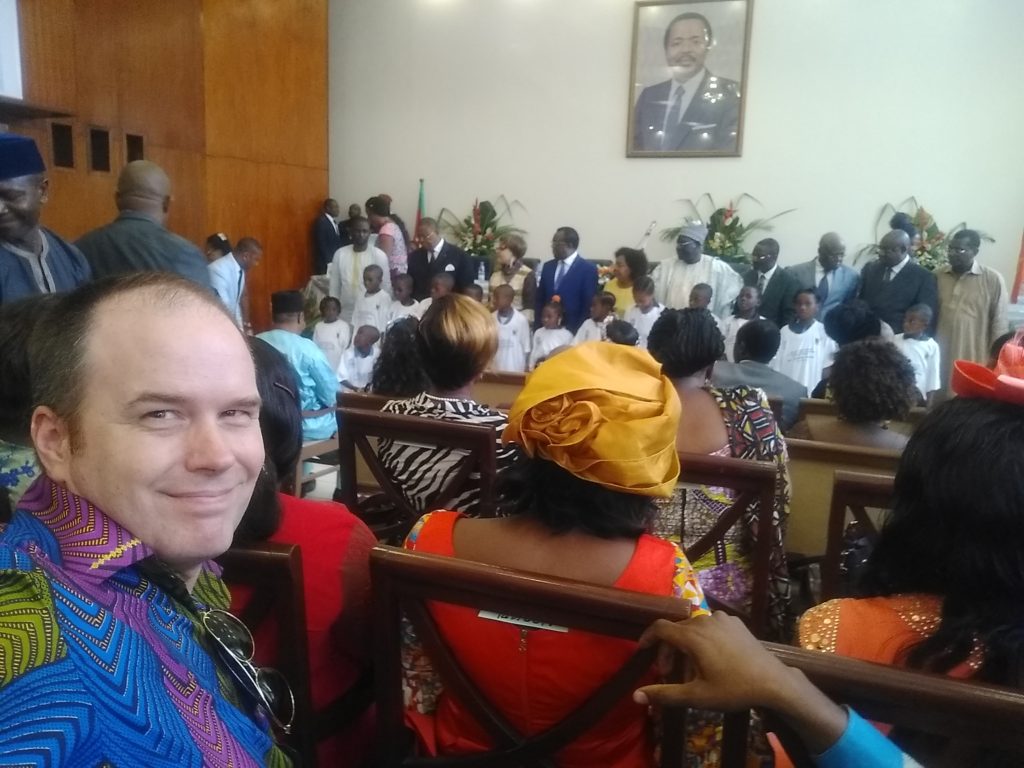
And later, I got to see him visit our table, and get a short spiel about our work and some brochures:
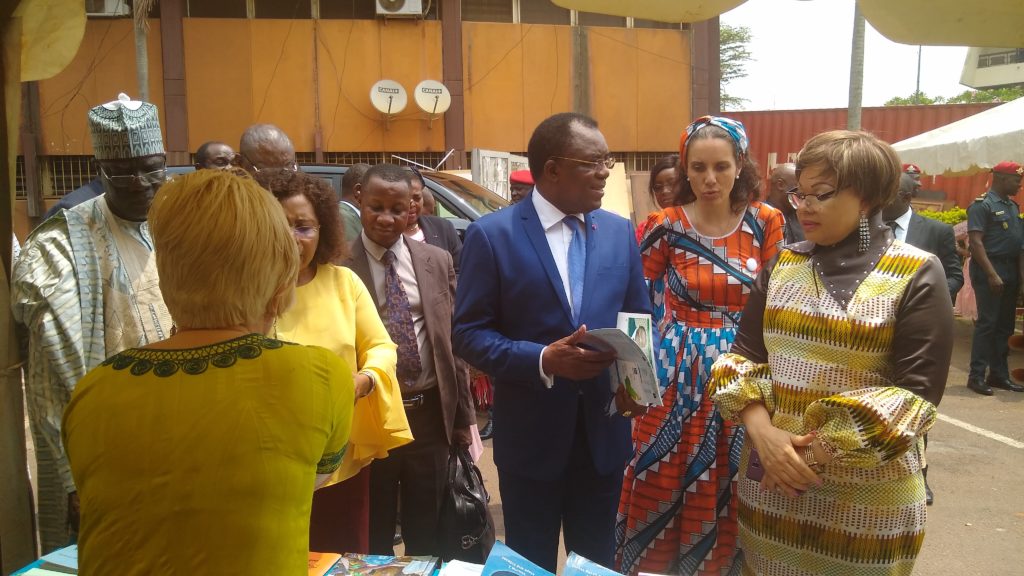
Anyway, the theme of the day (mother languages) is important to me, so I think it was a good investment to hang around and see how Cameroon does it.
One of the side benefits of the consultant conference I attended in September was that it was in Thailand, where some of our colleagues are based. Specifically, those who work on WeSay, a program I have put to good use in DRCongo, and hope to continue using in Cameroon. The same group also works on non-roman scripts (Writing Systems Technology). Anyway, I got to greet them face to face for the first time, having corresponded with some of them for more than a decade.
One of the highlights of that visit was seeing different font and printing issues they had faced. As I work in writing systems development, this was particularly interesting to me. They work on a different end of the puzzle, though: I work on figuring out what are the consonants, vowels, and tones in a language, and how to represent them well in writing (#FluentReadingMakesPowerfulBibles). This team works on how to take a developed writing system and represent it well in a (unicode!) font for printing.
They have examples of printed Bibles with roman scripts (like our letters, though with additional signs for additional vowels, tone, or other important language features):
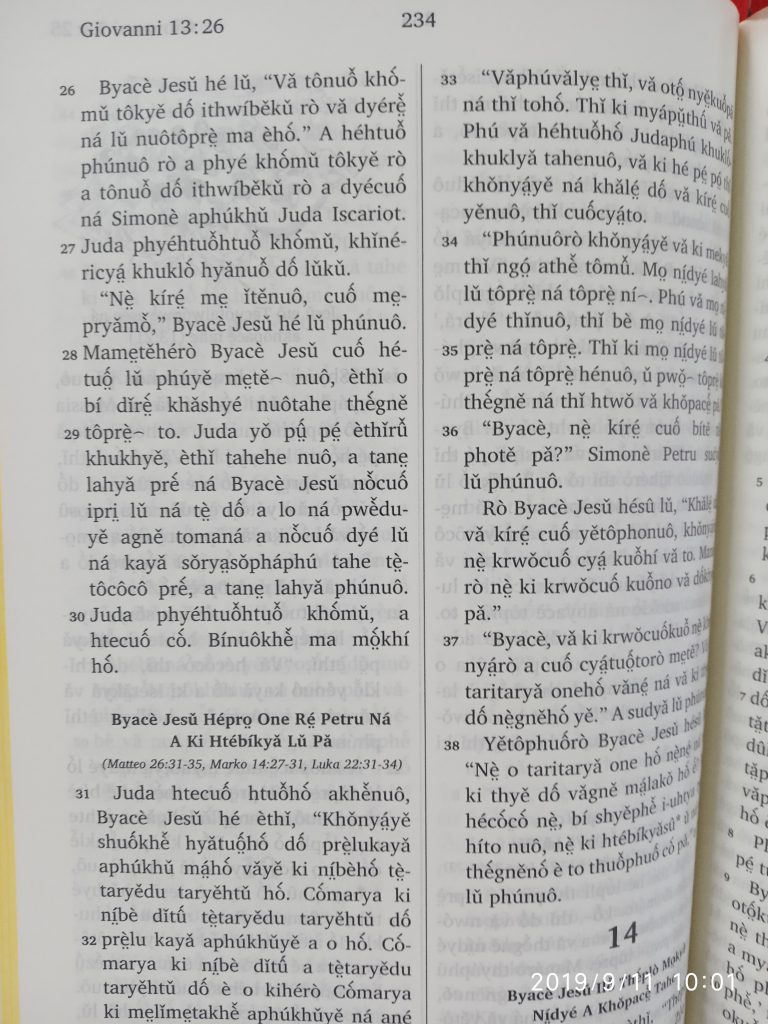
Even though this script is based on the same alphabet as English, you can see that there are some potential problems for typesetting it. For instance, in many places there are two distinct marks (diacritics) above a vowel, what we call “stacked diacritics”. For instance, in John 13:26 (the first verse on the page) Jesus’ second word “tônuô̌” has two different marks on the final vowel. I assume the one marks a vowel difference (i.e., “o” and “ô” are not the same vowel —like English “bet” and “bit” aren’t the same vowel), and the other marks a difference of tone (i.e., “o” is not the same tone as “ǒ” —like English “convict” (n) and “convict” (v) don’t have the same stress).
When you put these two together, and you have a potential conflict. In my browser anyway (and maybe in yours) the word “tônuô̌” has two diacritics (from ô and the ǒ) typed more or less on top of each other, rather than the diacritic on ǒ being placed above that on the ô, as it should be (and as in the printed Bible). If you scan through that page, you can see lots of variations of these stacked diacritics, meaning its is important to get this correct for printing.
But they also work with non-roman scripts:
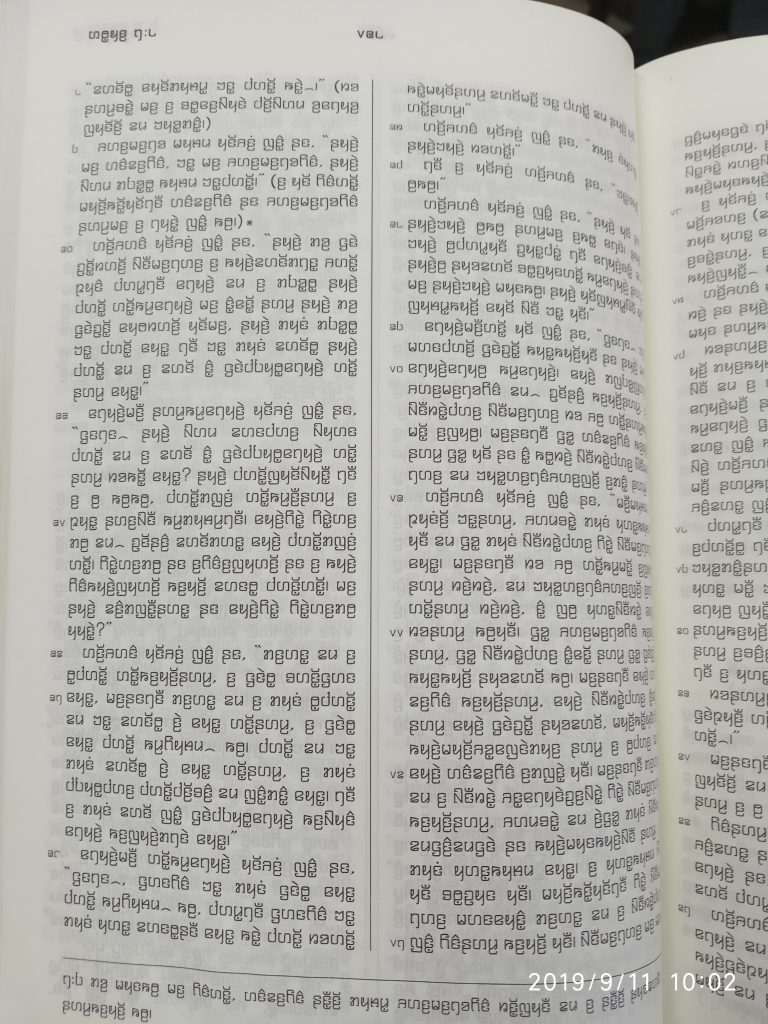
These scripts have their own issues, though I haven’t gotten into them myself, since most African languages I have worked with use roman scripts.
One interesting issue they had to deal with was multiple scripts for the same language. In this example, there was a script of high cultural value, which was not really understood by much of the population. So they wanted to print the valuable script in parallel with the script that people could actually understand:
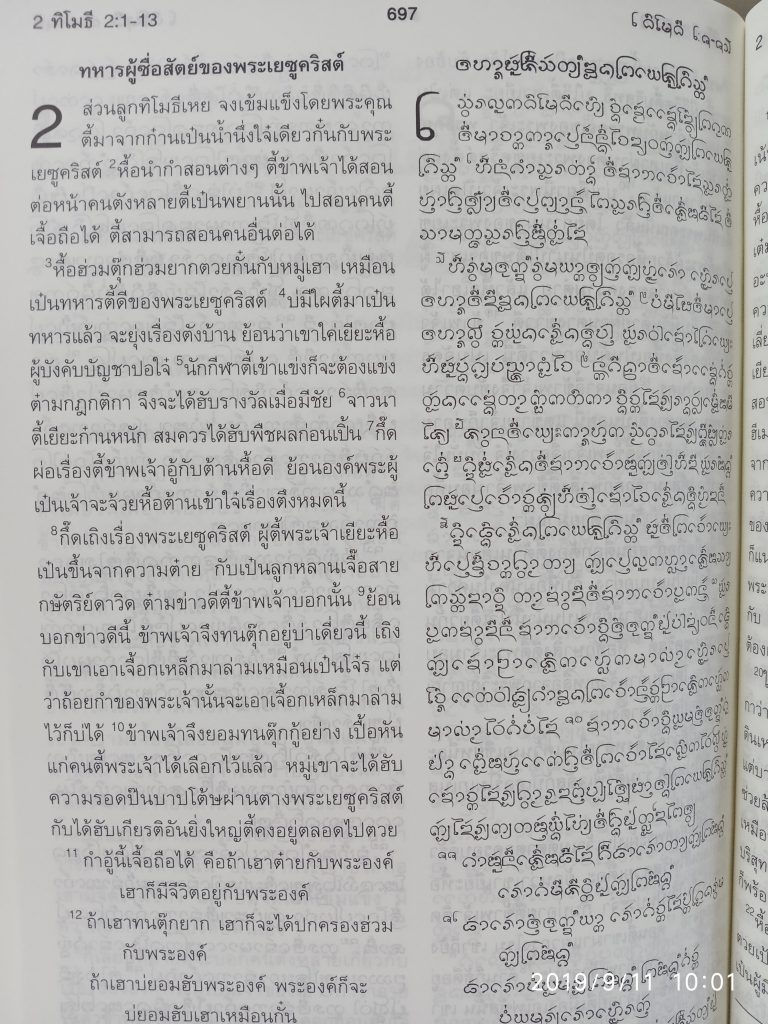
On some occasions, they have dealt with two (or three) scripts for the same language because it is spoken in multiple countries, and each country as it’s own mandated writing system. Converting checked scripture between these poses its own set of problems.
Here is yet another script:
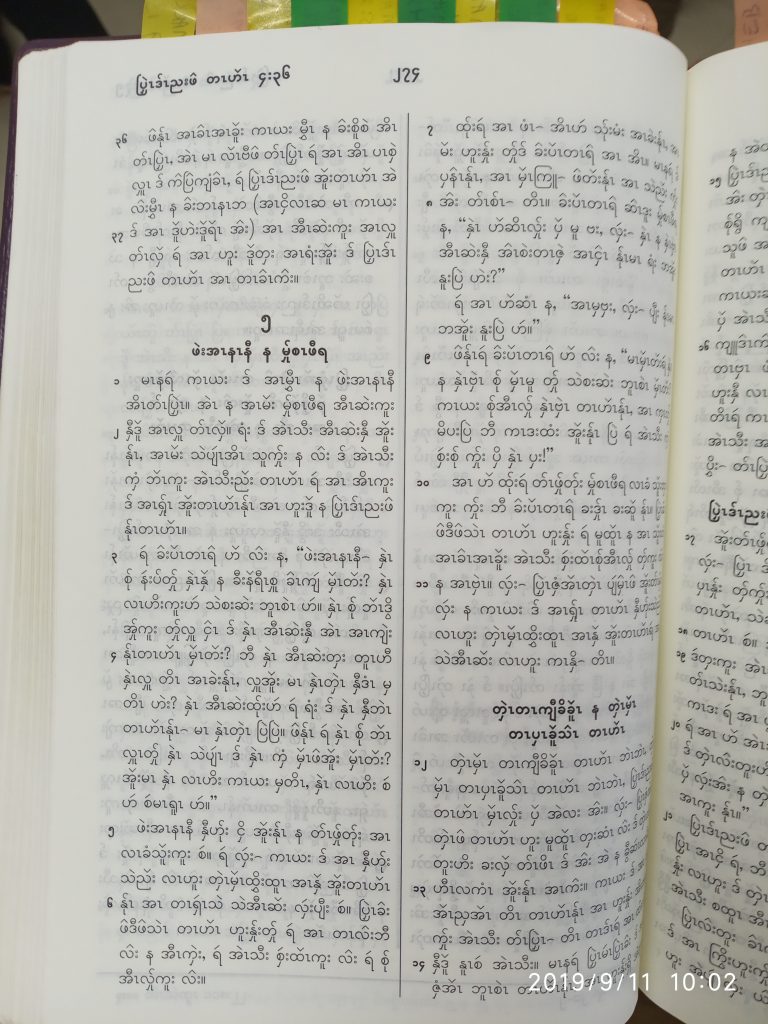
I don’t remember the details of this one, though the tabs a the top of the page each indicate a problem that needed to be fixed in terms of the printing of the writing system. How one writes is typically very important, both to individuals and people groups, so we want to be able to move past making mistakes if possible —though imagine checking the typesetting on this Bible!
Often the two books that help clarify and preserve a writing system are the Bible and a dictionary, which is why we want to get the work done on the writing system early, before we do a lot of printing of scripture portions. And it is again why I pair my dictionary work with writing system development, so people can see lots of words in writing, and give us feedback on problems with the writing system, whether they are technical or aesthetic.
This hard, technical work in advance is worth it because we want the scriptures to be used, and to speak with power into the hearts of the people who read and hear them read. For this to happen, the writing system needs to be acceptable and valued so people will use it, but also accurately reflect the language, so people can use it fluently. #FluentReadingMakesPowerfulBibles
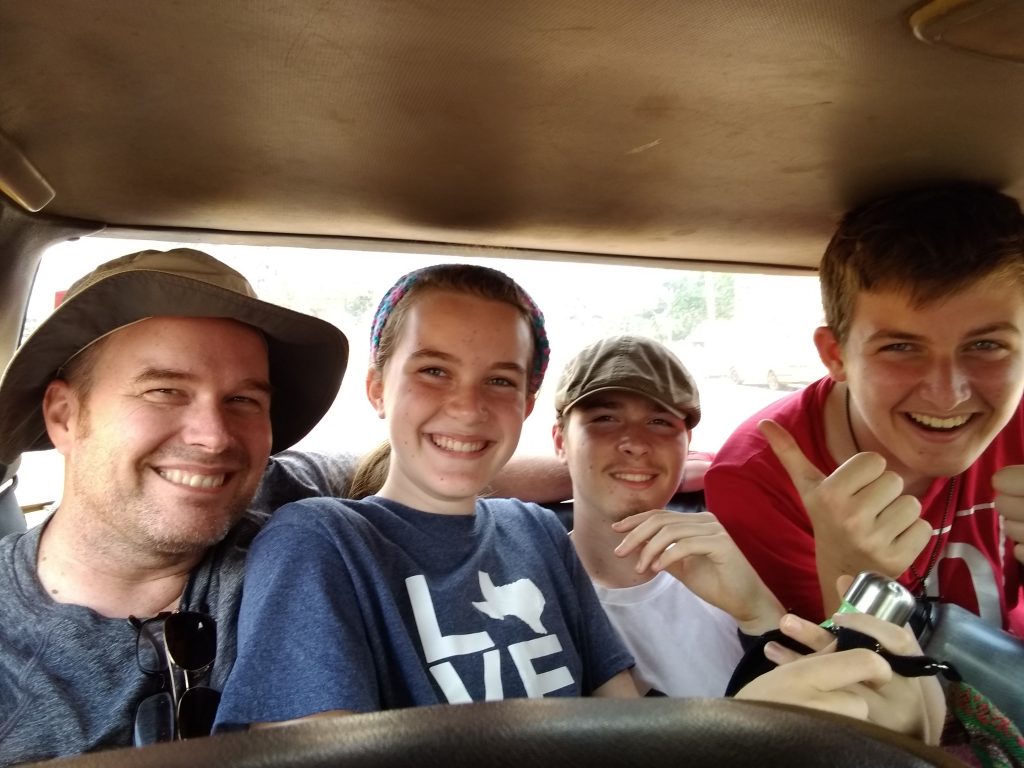
One thing that hasn’t changed much since we first visited Cameroon (in 2004) is the taxi system. They are fairly inexpensive, though they have a few drawbacks. First of all, they pack in people (normally into a Toyota Corolla), as you can see above and below (driver not pictured, but on the other side of Kim.…)
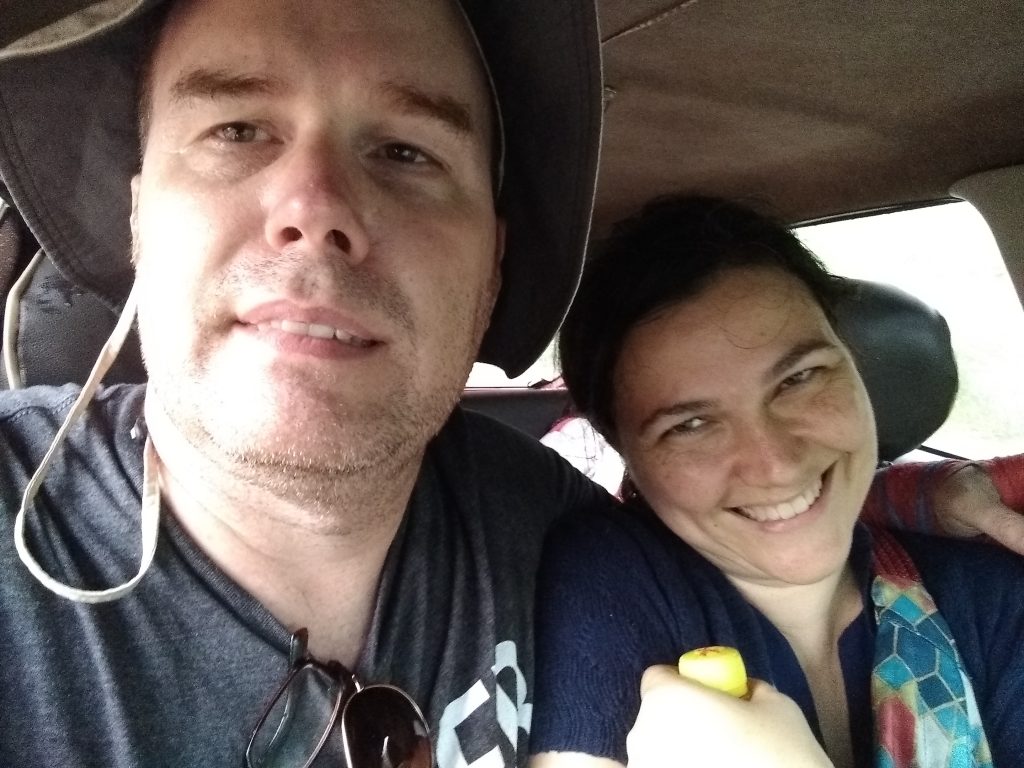
But it isn’t just people who get overloaded; it is also not uncommon to see stuff sticking out the back of a taxi:

One comment we heard that has helped us process traffic here is to not think of “my lane” and “your/oncoming lane.” Or, as we were otherwise told in understanding Cameroon, “Everything is negotiable.” How many “lanes” do you see in this photo?

On the far right (upper right in photo), you can see a yellow taxi on the side of the road, probably picking up or dropping off a fare. Behind him is a silver car edging in between us and the taxi in front of us. Passing the taxi in front of us is another silver car, straddling the center line. On the other side of him is an oncoming taxi, who is passing cars stopped on the other side of the road. Think of it as water, flowing around whatever other is there, including cars, people, motorcycles, and potholes. Then our driver passes:

I don’t remember who we were passing, but you can see we’re across the center line with oncoming traffic (don’t do this, James!), which we managed not to hit. And yes, that truck in the oncoming lane really is labelled “flammable liquid” (probably natural gas tanks for cooking).
One benefit of all this congestion is that things really don’t go very fast. On a trip downtown, I only get up to fourth gear once or twice, and over 60kmph (38mph) maybe once. So most of my driving has been in first or second gear, negotiating near gridlock, so any accident wouldn’t be very serious. In fact, I had a motorcycle hit me the other day, and he just kept on going.…
But the trip in the taxi is only half the fun; there are so many places you can go. One of my agenda items in these last three months has been to research church options. There turn out to be lots of different churches around, each with their own particular issues (as is true everywhere, I think). After spending a good chunk of time looking for signs on our main road, I realized that might not be the best option; this sign points to something that I never could find.…
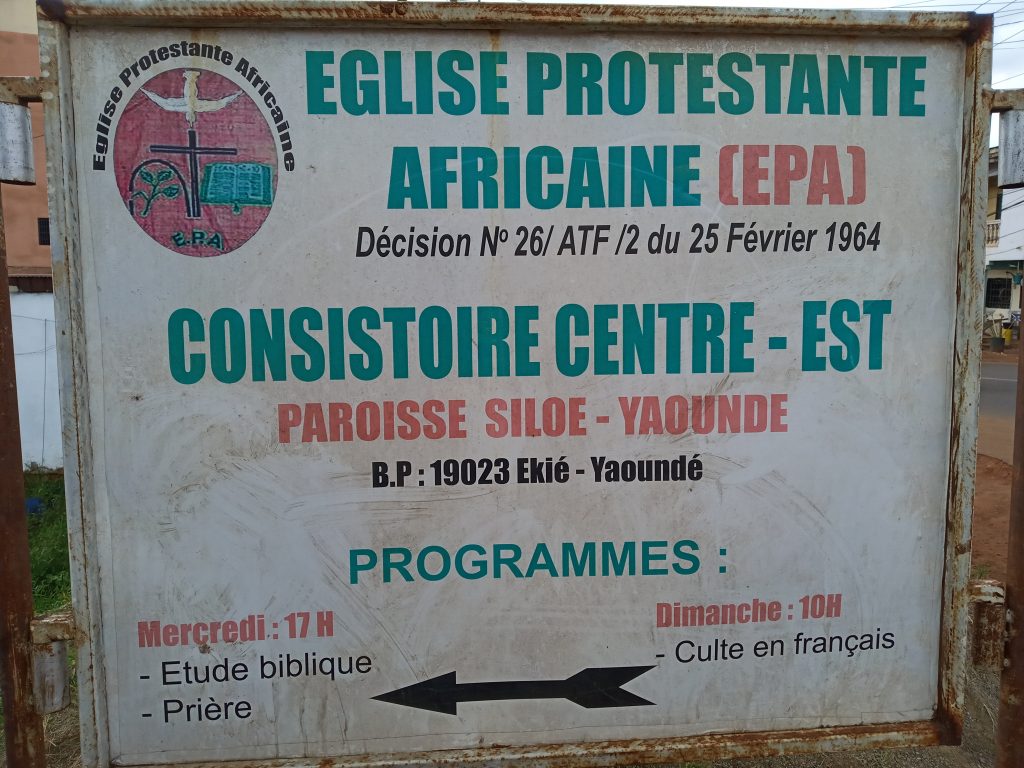
But we did find lots of other churches, smaller and larger, more baptist and more presbyterian, more village-esque and more televangel-esque. Most seem to have teaching at least bordering on prosperity as gospel. It has been easier getting around on Sunday mornings once we were able to use group cars, though not without issues. The car we checked out last Sunday stalled on the way to the church we planned to go to. We got it push-started, but we returned to our neighborhood, rather than park it in a neighborhood where push-starting it would have been much more problematic.
Whatever trouble we have getting around, we are glad to have on hand our missionary aviation colleagues. We visited the hangar one day, and got a few photo ops:

This program also has something we haven’t had before, a missionary helicopter:

There was even some art on the wall with the aviation mission statement:
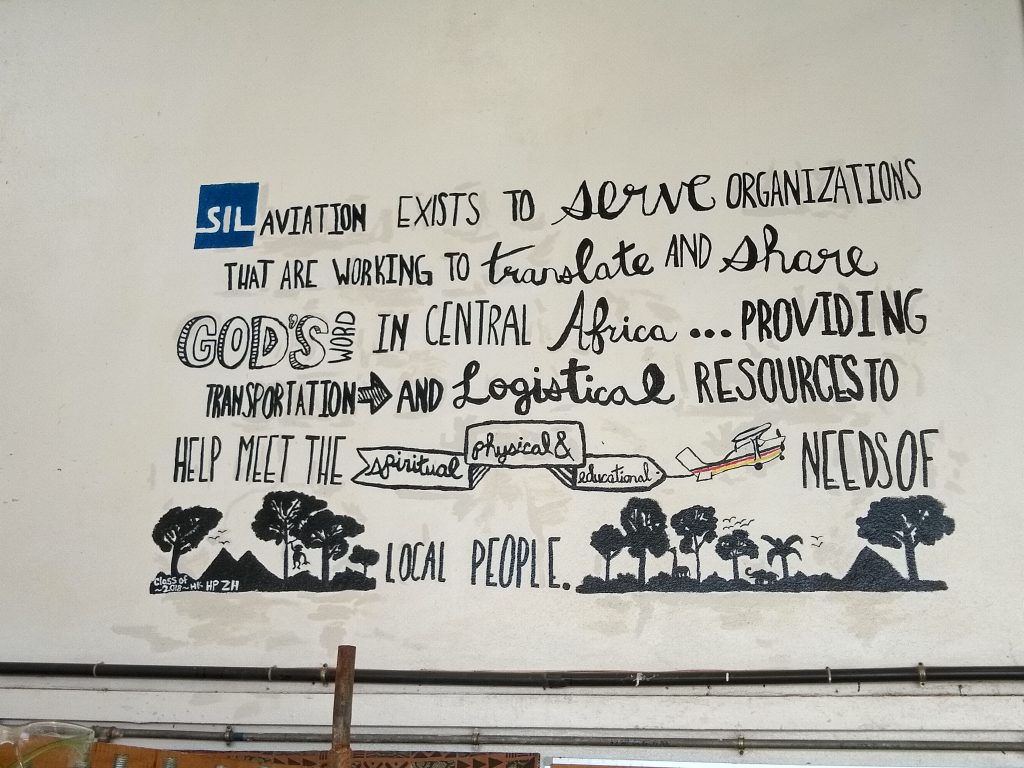
With some of the security issues in Cameroon right now, we aren’t able to go some of the places this aviation program has flown in the past —so they aren’t getting as much flight time as they’d like. But it is good to know they are there, and I look forward to flying with them some day!
Please pray for our safety and smooth travel as go out and about in Yaoundé and elsewhere in Cameroon. Please also pray for the larger security issues to be resolved, and for peace, development, and the growth in breadth and depth of the church of Jesus Christ in Cameroon!
The narrative found in 1 Kings 13 is very important to me, personally, because it played a key role in figuring out what to do in my life. How do we understand God’s call on an individual? But despite the very clear and very personal application illuminated to me at that time, I don’t think that message is central to the narrative; something much larger is. Reading through the Kings, one often finds an Israelite king evaluated on where he stands regarding “the sin of Jeroboam”. You find this everywhere. But what is this sin? This is the chapter that describes God’s careful, repeated pleas to Jeroboam, and his response. So this is, at least for me, another shining example of Grace in the old testament. This wicked king is not simply cast aside, but he is given repeated clear warnings, followed by repeated confirmations. God grant that we would fear this example, listen to God’s word, trust Him, and repent.
The story begins on the heels of the division of the nation in chapter 12 into the northern Israel, now lead by Jeroboam, and the southern Judah, still lead by Rehoboam the son of Solomon and grandson of David. Since long before the capital was decided, Moses made clear that national unity would be upheld in part by having a single altar on which to worship God –which is why worshiping on other “high places” was a problem for many of the Israelite kings. In case you might doubt that Jeroboam had read his Moses, he makes his rationale for setting up new altars clear (all ESV):
26And Jeroboam said in his heart, “Now the kingdom will turn back to the house of David. 27If this people go up to offer sacrifices in the temple of the Lord at Jerusalem, then the heart of this people will turn again to their lord, to Rehoboam king of Judah, and they will kill me and return to Rehoboam king of Judah.” 28So the king took counsel and made two calves of gold. And he said to the people, “You have gone up to Jerusalem long enough. Behold your gods, O Israel, who brought you up out of the land of Egypt.” 29And he set one in Bethel, and the other he put in Dan.
So the point of these altars (at the southern and northern limits of his domain) was to give people some other place to worship, so they wouldn’t reunite the country under the worship prescribed by Moses and the line of David (and ultimately kill him, as well).
God’s assessment of this move is clear enough, calling the people religious tourists:
30Then this thing became a sin, for the people went as far as Dan to be before one. 31He also made temples on high places and appointed priests from among all the people, who were not of the Levites. 32And Jeroboam appointed a feast on the fifteenth day of the eighth month like the feast that was in Judah, and he offered sacrifices on the altar. So he did in Bethel, sacrificing to the calves that he made. And he placed in Bethel the priests of the high places that he had made. 33He went up to the altar that he had made in Bethel on the fifteenth day in the eighth month, in the month that he had devised from his own heart. And he instituted a feast for the people of Israel and went up to the altar to make offerings.
So Jeroboam made up his own gods/idols to worship, his own places to worship them, his own schedule for worshiping, and his own priests to run the whole thing. He basically reinvented everything God had handed down through Moses, to forge a new identity for the northern kingdom, to cement his rule, and save his life.
The question now is, given this full-frontal assault on the worship of God, what will God do about it? Chapter thirteen tells the story of a prophet God sent from the southern Kingdom:
1And behold, a man of God came out of Judah by the word of the Lord to Bethel. Jeroboam was standing by the altar to make offerings.
I think it is important that the setting is Jeroboam, in the middle of making his own offerings at this altar, since the prophecy has to do with both him and the altar. First, against the altar:
2And the man cried against the altar by the word of the Lord and said, “O altar, altar, thus says the Lord: ‘Behold, a son shall be born to the house of David, Josiah by name, and he shall sacrifice on you the priests of the high places who make offerings on you, and human bones shall be burned on you.’”
In light of what I wrote above, you could take this to mean that the Davidic line that you thought to overcome with this altar will ultimately overcome this altar, and you and your priests will be overcome as well. And to confirm this word, he gave a sign:
3And he gave a sign the same day, saying, “This is the sign that the Lord has spoken: ‘Behold, the altar shall be torn down, and the ashes that are on it shall be poured out.’”
But Jeroboam does not bend to this; rather, he attacks the prophet, and in response receives a sign in his own body:
4And when the king heard the saying of the man of God, which he cried against the altar at Bethel, Jeroboam stretched out his hand from the altar, saying, “Seize him.” And his hand, which he stretched out against him, dried up, so that he could not draw it back to himself.
Then the sign from v3 is fulfilled:
5The altar also was torn down, and the ashes poured out from the altar, according to the sign that the man of God had given by the word of the Lord.
What comes next is a dynamic that always intrigues me. What does God strike someone, only to then heal? He did the same thing with Moses and Pharoah, on multiple occasions. I think it is at least twofold. First, if there was any doubt why the sign occurred, that doubt is removed by the fact that the prophet has the ear of God to heal it:
6And the king said to the man of God, “Entreat now the favor of the Lord your God, and pray for me, that my hand may be restored to me.” And the man of God entreated the Lord, and the king’s hand was restored to him and became as it was before.
But the second reason God did this, I think, is a theme I see developing through this whole chapter: God is being merciful. It’s like God says, “Look, I could just cripple/kill you and be done with it, but I’m not going to. I don’t want you crippled/dead, I want you repentant.”
Jeroboam seems to get that mercy, and he wants to reward the prophet:
7And the king said to the man of God, “Come home with me, and refresh yourself, and I will give you a reward.”
The prophet refuses:
8And the man of God said to the king, “If you give me half your house, I will not go in with you. And I will not eat bread or drink water in this place,
And then he says why, revealing information that is key to the whole chapter:
9for so was it commanded me by the word of the Lord, saying, ‘You shall neither eat bread nor drink water nor return by the way that you came.’”
That is, this prophet was not just given a word to speak against the altar, and against Jeroboam and his priests, but he was also himself given a command about how he was to act in doing so. Don’t accept their hospitality, and don’t take the same route home. Act as if you are in hostile territory, because you are. And he looks ready to obey this command:
10So he went another way and did not return by the way that he came to Bethel.
Having concluded the first act, we are now introduced to another prophet, who lives in the northern kingdom, and is informed of everything that happened at the altar:
11Now an old prophet lived in Bethel. And his sons came and told him all that the man of God had done that day in Bethel. They also told to their father the words that he had spoken to the king.
For whatever reason, this prophet chases down the other:
12And their father said to them, “Which way did he go?” And his sons showed him the way that the man of God who came from Judah had gone. 13And he said to his sons, “Saddle the donkey for me.” So they saddled the donkey for him and he mounted it.
And he finds him and confirms his identity:
14And he went after the man of God and found him sitting under an oak. And he said to him, “Are you the man of God who came from Judah?” And he said, “I am.”
And he also offers him hospitality:
15Then he said to him, “Come home with me and eat bread.”
Maybe this was just to be nice, but this prophet new he was asking the other to disobey the command God had given him. And again at first, the prophet refuses, in obedience to the Lord’s command:
16And he said, “I may not return with you, or go in with you, neither will I eat bread nor drink water with you in this place, 17for it was said to me by the word of the Lord, ‘You shall neither eat bread nor drink water there, nor return by the way that you came.’”
So far so good for the Judean prophet. But this is where things get sticky, as the Israelite prophet tests his resolve with a lie:
18And he said to him, “I also am a prophet as you are, and an angel spoke to me by the word of the Lord, saying, ‘Bring him back with you into your house that he may eat bread and drink water.’” But he lied to him.
It is important to understand (for what follows) that the lie doesn’t have to include everything that he said. He was a prophet: he is described as a prophet in v11, and gives true prophecy from the Lord in v21. He is certainly not “as you are” in all respects, but the clear lie is the word he claims to have received. In the face of the lie, the Judean prophet relents, and accepts his hospitality:
19So he went back with him and ate bread in his house and drank water.
Having now disobeyed the command he was given by God, God sends a word to the other prophet, declaring the Judean prophet’s doom:
20And as they sat at the table, the word of the Lord came to the prophet who had brought him back. 21And he cried to the man of God who came from Judah, “Thus says the Lord, ‘Because you have disobeyed the word of the Lord and have not kept the command that the Lord your God commanded you, 22but have come back and have eaten bread and drunk water in the place of which he said to you, “Eat no bread and drink no water,” your body shall not come to the tomb of your fathers.’”
In what seems highly ironic to me, he then continues to be hospitable to the prophet, and send him on his way. Hi could have forced the fulfillment of his prophecy by killing him there, but he didn’t:
23And after he had eaten bread and drunk, he saddled the donkey for the prophet whom he had brought back.
But the word of the Israelite prophet was fulfilled:
24And as he went away a lion met him on the road and killed him. And his body was thrown in the road, and the donkey stood beside it; the lion also stood beside the body.
The Israelite prophet hears what happened, and correctly interprets the news:
25And behold, men passed by and saw the body thrown in the road and the lion standing by the body. And they came and told it in the city where the old prophet lived. 26And when the prophet who had brought him back from the way heard of it, he said, “It is the man of God who disobeyed the word of the Lord; therefore the Lord has given him to the lion, which has torn him and killed him, according to the word that the Lord spoke to him.”
Not that the word that the Lord spoke to him was the word spoken by the Israelite prophet, over the forbidden meal. He goes to get the body, noting the remarkable circumstance that neither the man nor the donkey had been mauled:
27And he said to his sons, “Saddle the donkey for me.” And they saddled it. 28And he went and found his body thrown in the road, and the donkey and the lion standing beside the body. The lion had not eaten the body or torn the donkey.
so he took the body of the Judean prophet, brought him home, and mourned him:
29And the prophet took up the body of the man of God and laid it on the donkey and brought it back to the city to mourn and to bury him. 30And he laid the body in his own grave. And they mourned over him, saying, “Alas, my brother!” 31And after he had buried him, he said to his sons, “When I die, bury me in the grave in which the man of God is buried; lay my bones beside his bones.
This might seem too much irony, for the man who laid the trap that killed the Judean prophet, to mourn him so. But with the next line we understand that his action has been further confirmation of the word spoken to the Judean prophet:
32For the saying that he called out by the word of the Lord against the altar in Bethel and against all the houses of the high places that are in the cities of Samaria shall surely come to pass.”
That is, we have the initial sign of the altar being split (given in v3, accomplished in v5), the sign of Jeroboam’s paralysis (stricken in v4, healed in v6), but now also the confirmation that the third thing the prophet said was also God’s command: that he should not accept hospitality in Israel. This word is confirmed by the miraculous manner of his death, once he disobeyed that command. So that we know that this was a true prophet, and that they word that he declared against the altar would come to pass.
Unfortunately, given all these proofs, Jeroboam did not repent:
33After this thing Jeroboam did not turn from his evil way, but made priests for the high places again from among all the people. Any who would, he ordained to be priests of the high places. 34And this thing became sin to the house of Jeroboam, so as to cut it off and to destroy it from the face of the earth.
This sin ultimately leads to the removal of this kingdom from the land, as foretold in chapter 14:15-16, in response to Jeroboam’s wife’s covert inquiry about their sick son:
the Lord will strike Israel as a reed is shaken in the water, and root up Israel out of this good land that he gave to their fathers and scatter them beyond the Euphrates, because they have made their Asherim, provoking the Lord to anger. And he will give Israel up because of the sins of Jeroboam, which he sinned and made Israel to sin.
This is a stark contrast to the commendation of David in chapter 15:4-5, after the birth of Rehoboam’s son, sinful and faithless Abijam:
Nevertheless, for David’s sake the Lord his God gave him a lamp in Jerusalem, setting up his son after him, and establishing Jerusalem, because David did what was right in the eyes of the Lord and did not turn aside from anything that he commanded him all the days of his life, except in the matter of Uriah the Hittite.
It seems to me that there are so many things we can and will get wrong, but that isn’t God’s primary concern. Even David’s commendation includes the matter of Uriah the Hittite, a “small affair” of adultery, lying, and eventually murder. The difference I see is that David was repentant, asked for Grace, and received it. On the other hand, Jeroboam received multiple proofs that God was serious, but refused to bend, and ultimately led to the destruction of his nation.
There is another application that I take from this, for the Man of God. His real moment of failure was falling for the lie, in preference to the word given to himself. So, when faced with a word of God in apparent conflict with another word of God, take another look, and see the lie for what it is.
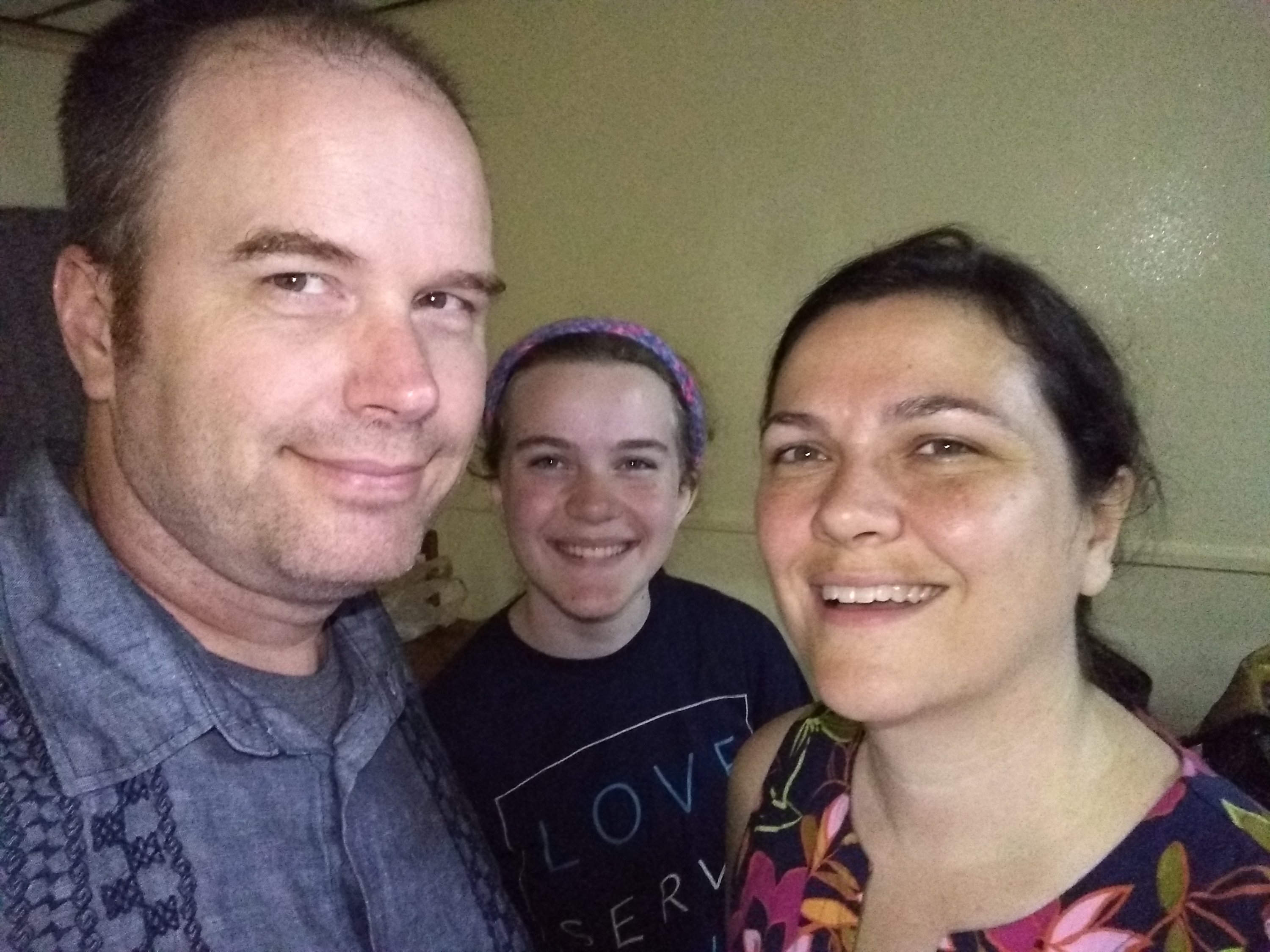 We made it to Cameroon tonight, though a bit late and half a bag short. ;-)Thanks to all who have been with us in this transition; we made it directy into the house we will be staying in the next couple months, at least.
We made it to Cameroon tonight, though a bit late and half a bag short. ;-)Thanks to all who have been with us in this transition; we made it directy into the house we will be staying in the next couple months, at least.